-
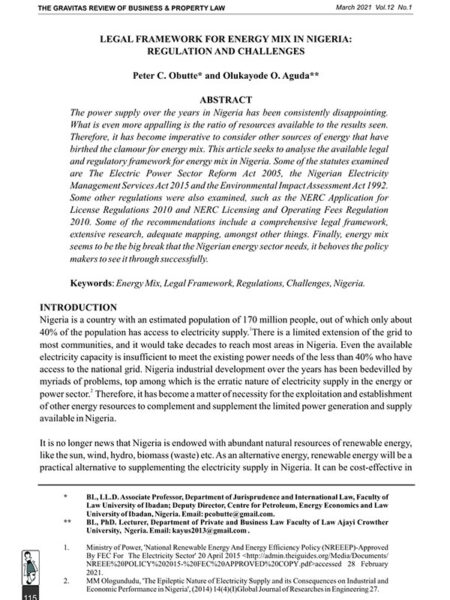
Legal Framework for Energy Mix in Nigeria: Regulation and Challenges
0₦2,500.00Dr Peter Obutte, Associate Professor, Faculty of Law, University of Ibadan and Dr Olukayode Aguda of the Faculty of Law, Ajayi Crowther University, in their article, Legal Framework for Energy Mix in Nigeria: Regulation and Challenges, note that energy mix refers to the combination of the various primary energy sources used to meet energy needs: fossil fuels (oil, natural gas and coal), nuclear energy, and renewable energy sources. Dr Obutte and Dr Aguda analyse the legal and regulatory framework for energy mix in Nigeria. They posit that energy mix seems to be the big break that the Nigerian energy sector needs, and it behooves the policymakers to see it through successfully with a comprehensive legal framework, extensive research and adequate mapping, amongst other things.
-
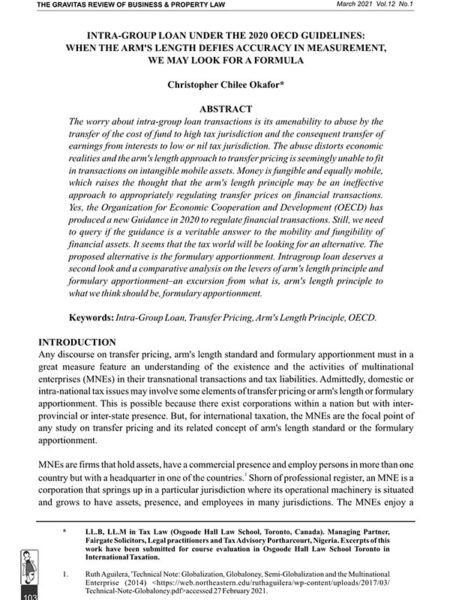
Intra-Group Loan Under the 2020 OECD Guidelines: When the Arm’s Length Defies Accuracy in Measurement, We May Look for a Formula
0₦2,500.00Christopher Okafor, Managing Partner, Fairgate Solicitors, Legal Practitioners and Tax Advisory Port Harcourt, Nigeria, in his article, Intra-Group Loan Under the 2020 OECD Guidelines: When the Arm’s Length Defies Accuracy in Measurement, We May Look for a Formula, argues that the worry about intra-group loan transactions is its amenability to abuse by the transfer of the cost of fund to high tax jurisdiction and the consequent transfer of earnings from interests to low or nil tax jurisdiction. The abuse distorts economic realities, and the arm’s length approach to transfer pricing is seemingly unable to fit in transactions on intangible mobile assets. Though the Organization for Economic Cooperation and Development (OECD) has produced a new Guidance in 2020 to regulate intra-group loan, it is moot whether the guidance is a veritable answer to the mobility and fungibility of financial assets. Christopher proposes an alternative to the arm’s length principle. In his words, intragroup loan deserves a second look and a comparative analysis on the levers of arm’s length principle and formulary apportionment–an excursion from what is, arm’s length principle to what we think should be, formulary apportionment.
-
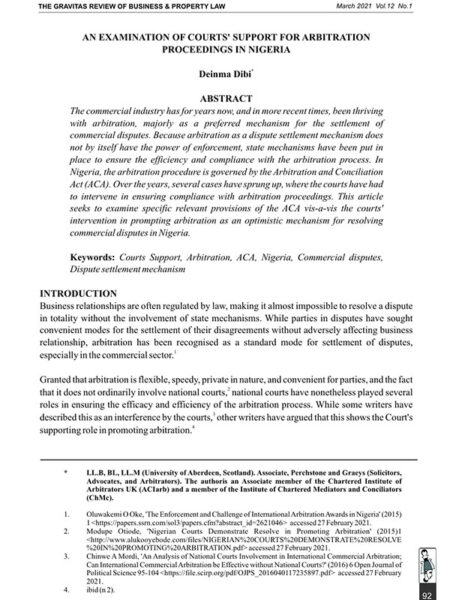
An Examination of Courts’ Support for Arbitration Proceedings in Nigeria
0₦2,500.00Deinma Dibi, Associate at Perchstone and Graeys in his article, An Examination of Courts’ Support for Arbitration Proceedings in Nigeria, examines the Arbitration and Conciliation Act, and decided cases to identify ways in which the courts in Nigeria support arbitral proceedings.
-
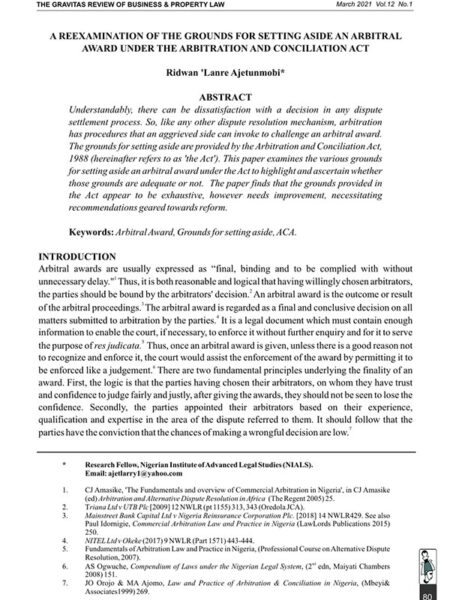
A Reexamination of the Grounds for Setting Aside an Arbitral Award Under the Arbitration and Conciliation Act
0₦2,500.00Ridwan Ajetunmobi, Research Fellow at the Nigerian Institute of Advanced Legal Studies, in his article, A Reexamination of the Grounds for Setting Aside an Arbitral Award Under the Arbitration and Conciliation Act, critically examines the various grounds for setting aside an arbitral award under the ACA. Ajetunmobi considers the adequacy of the grounds, the procedure for, and the legal effect of, setting aside an award. He proffers recommendations for further reform.
-
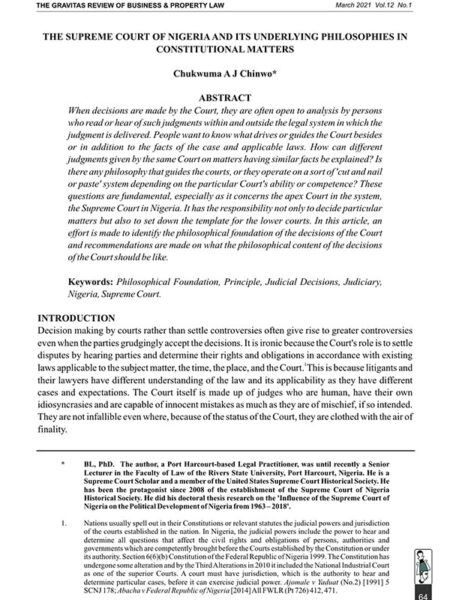
The Supreme Court of Nigeria and its Underlying Philosophies in Constitutional Matters
0₦2,500.00Dr Chukwuma Chinwo, formerly Senior Lecturer at the Rivers State University, and now a Port Harcourt-based Legal Practitioner in his article, The Supreme Court of Nigeria and its Underlying Philosophies in Constitutional Matters, asks a question that bothers many: How can the same Court give different judgments on matters having similar facts? Dr Chinwo examines the Supreme Court of Nigeria’s judicial philosophy. From an extensive review of several Supreme Court decisions, he weaves a coherent thread of factors that influence the Court’s judgments.
-
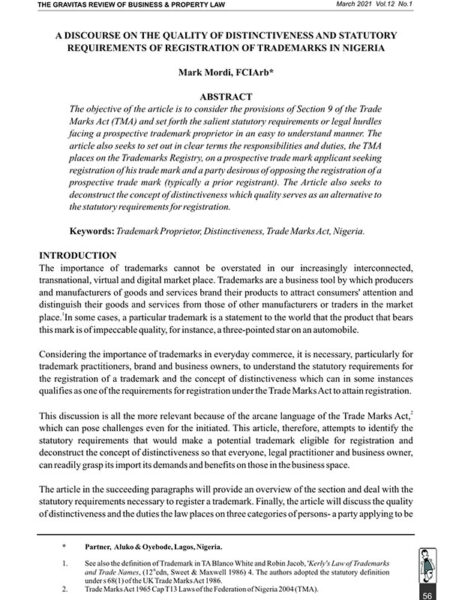
A Discourse on the Quality of Distinctiveness and Statutory Requirements of Registration of Trademarks in Nigeria
0₦2,500.00Mark Mordi, Partner Aluko & Oyebode in, A Discourse on the Quality of Distinctiveness and Statutory Requirements of Registration of Trademarks in Nigeria, deconstructs the concept of distinctiveness which quality, serves as an alternative to the statutory requirements for registration. Mordi examines the responsibilities and duties the Trade Marks Act 1965 places on the Trademarks Registry, on a prospective trademark applicant seeking registration of his trademark, and a party desirous of opposing a trademark registration (typically a prior registrant).
-
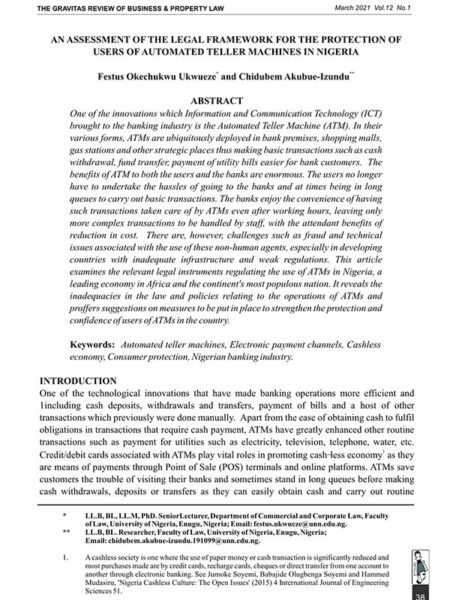
An Assessment of the Legal Framework for the Protection of Users of Automated Teller Machines in Nigeria
0₦2,500.00Dr Festus Ukwueze and Chidubem Akubue-Izundu of the Faculty of Law University of Nigeria Enugu Nigeria in their article, An Assessment of the Legal Framework for the Protection of Users of Automated Teller Machines in Nigeria, note the convenience and benefits of ATMs: faster cash withdrawals, easy fund transfer, convenient payment of utility bills. There are, however, challenges, mainly fraud and technical issues associated with the use of these non-human agents. Dr Ukwueze and Akubue-Izundu comprehensively review the relevant legal instruments regulating the use of ATMs in Nigeria. They posit that the laws and policies relating to ATMs’ operations are inadequate and proffer suggestions on measures to be put in place to strengthen the protection and confidence of users of ATMs in the country.
-
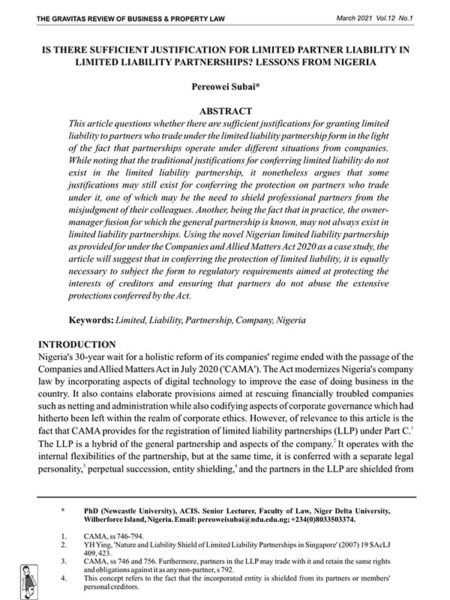
Is There Sufficient Justification for Limited Partner Liability in Limited Liability Partnerships? Lessons from Nigeria
0₦2,500.00Dr Pereowei Subai, Senior Lecturer, Faculty of Law Niger Delta University Wilberforce Island Nigeria in his article, Is There Sufficient Justification for Limited Partner Liability in Limited Liability Partnerships? Lessons from Nigeria, questions whether there are sufficient justifications for granting limited liability to partners who trade under limited liability partnership in the light of the fact that partnerships operate under different situations from companies. While the traditional justifications for conferring limited liability do not exist in the limited liability partnership, Dr Subai argues that some justifications may still exist for granting the protection on partners who trade under it. A significant reason is the need to shield professional partners from the misjudgment of their colleagues. Using the Companies and Allied Matters Act 2020 as a case study, Dr Subai suggests that in conferring the protection of limited liability, it is necessary to subject the form to regulatory requirements aimed at protecting the interests of creditors and ensuring that partners do not abuse the extensive protections conferred by the Act.
-
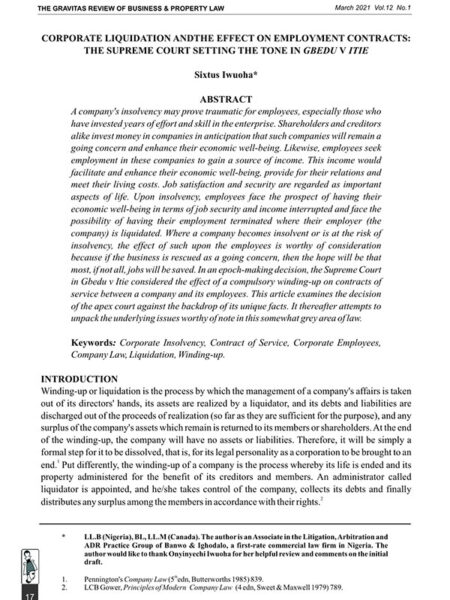
Corporate Liquidation and the Effect on Employment Contracts: The Supreme Court Setting the Tone in Gbedu v Itie
0₦2,500.00Sixtus Iwuoha, Associate at Banwo & Ighodalo in his article, Corporate Liquidation and the Effect on Employment Contracts: The Supreme Court Setting the Tone in Gbedu v Itie discusses the effect of a compulsory and voluntary winding-up of a company on employment contracts of workers in his review of the epoch-making decision of the Supreme Court in the case of Gbedu v Itie.
-
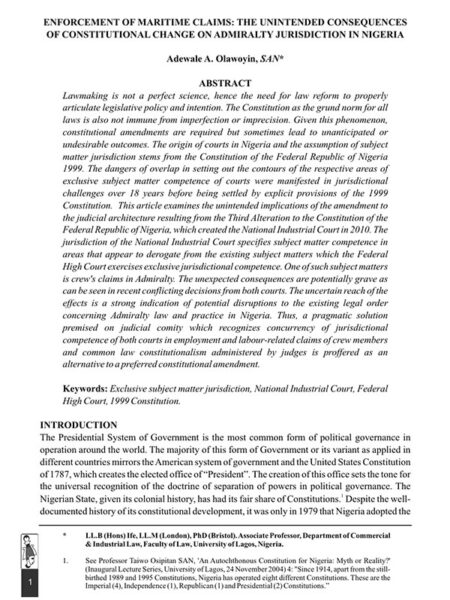
Enforcement of Maritime Claims: The Unintended Consequences of Constitutional Change on Admiralty Jurisdiction in Nigeria
0₦2,500.00Dr Adewale Olawoyin SAN, Associate Professor, Department of Commercial & Industrial Law University of Lagos Nigeria in his article, Enforcement of Maritime Claims: The Unintended Consequences of Constitutional Change on Admiralty Jurisdiction in Nigeria, examines the unintended implications of the Third Alteration to the 1999 Constitution of Nigeria. Section 251 of the 1999 Constitution vests exclusive jurisdiction in admiralty matters in the Federal High Court (FHC). Section 254C (1) of the Constitution (introduced by the Constitution of the Federal Republic of Nigeria (Third Alteration) Act 2010) vests exclusive jurisdiction in all labour and employment matters in the National Industrial Court (NIC). Meanwhile, by the Admiralty Jurisdiction Act(AJA) 1991, the admiralty jurisdiction of the FHC includes maritime claim. Section 2(3)(r) AJA provides that a ‘general maritime claim’ consists of a claim by a master or a member of a ship’s crew for wages or an amount that an employer is obliged to pay his employee. Section 5(3) AJA also provides that ‘maritime lien’ means a lien for wages of the master or of a member of a ship’s crew. Dr Olawoyin SAN considers conflicting decided cases on which Court, FHC or NIC, that would have jurisdiction in claims by the crew of a ship relating to their wages. He proposes legislative and judicial intervention to resolve the legal quagmire.
-
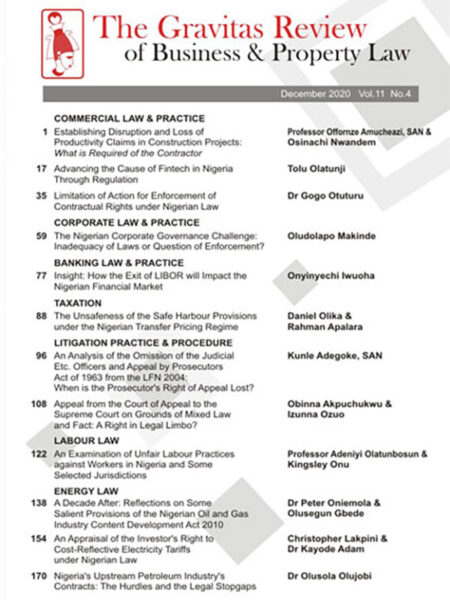
The Gravitas Review of Business & Property Law Vol.11 No.4 – Print
0₦5,000.00In this issue of The Gravitas Review of Business & Property Law Vol.11 No.4, there are well researched articles on:
- Commercial Law & Practice
- Corporate Law & Practice
- Banking Law & Practice
- Taxation
- Litigation Practice & Procedure
- Labour Law
- Energy Law
-

The Gravitas Review of Business & Property Law Vol.11 No.4 – E-Book
0₦5,000.00In this issue of The Gravitas Review of Business & Property Law Vol.11 No.4, there are well researched articles on:
- Commercial Law & Practice
- Corporate Law & Practice
- Banking Law & Practice
- Taxation
- Litigation Practice & Procedure
- Labour Law
- Energy Law
The Gravitas Review of Business & Property Law



